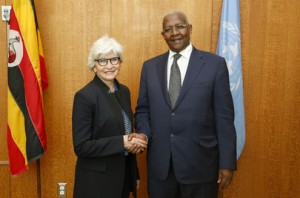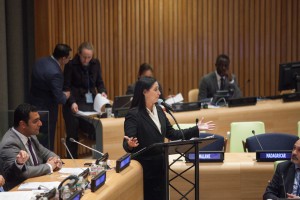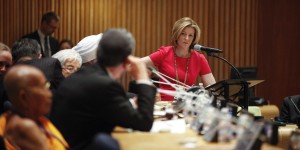New York, 22 April 2015
Statement attributable to the Spokesperson for the President of the General Assembly

President Kutesa with UN Secretary-General, Mr. Ban Ki-moon, and the UN High Representative for the Alliance of Civilizations, H.E. Mr. Nassir Abdulaziz Al-Nasser, with world faith leaders. Photo/Martin Dixon
High-Level Thematic Debate on Promoting Tolerance and Reconciliation
The President of the General Assembly (PGA), H.E. Mr. Sam Kahamba Kutesa, opened at the United Nations Headquarters in New York, a two-day High-Level Thematic Debate on “Promoting Tolerance and Reconciliation: Fostering Peaceful, Inclusive Societies and Countering Violent Extremism.” The event was convened by the PGA in conjunction with the United Nations Secretary-General, H.E. Mr. Ban Ki-moon, and the United Nations High Representative for the Alliance of Civilizations, H.E. Mr. Nassir Abdulaziz Al-Nasser.
Opening the High-Level event, President Kutesa noted that around the world, people, communities and nations are grappling with a disquieting rise of radicalization and violent extremism, fuelled by identity-based conflicts and cultural and religious tensions. He added that with troubling frequency, violent attacks are being carried out against innocent civilians in places of worship, museums, supermarkets, schools and historical sites. These abhorrent crimes claim the lives of men, women and children indiscriminately, leaving devastated families and communities in their wake.
Secretary-General Ban Ki-moon noted that violent extremism is marked by villains against victims. But stressing that “we should also remember the heroes”, the Secretary-General stated that “throughout history, there have been brave individuals who transcended their identity to help others in danger simply because we are part of the same human family. These heroes risked and even gave their own lives for what they knew was right. And in the process, they inspired others to take up the cause.” Mr. Ban urged participants to confront the worst, and be inspired by the best. “In the name of our shared humanity, we must unite with courage and resolve”, he stated.

From left: Mr. Ali Babacan, Deputy Prime Minister of Turkey, Ms Isabel Saint Malo de Alvarado, Vice-President and Minister for Foreign Affairs of Panama, SG Ban Ki-moon, President Kutesa, UN High Representative for the Alliance of Civilizations, Mr. Nassir Abdulaziz Al-Nasser and Mr. Nasser Judeh, Deputy Prime Minister and Minister for Foreign Affairs of Jordan.Photo/Martin Dixon
Noting that the United Nations Organization is writing history on the occasion of this event, H.E. Mr. Nassir Abdulaziz Al-Nasser remarked that “for the first time ever, the Secretary General, the President of the General Assembly and the High Representative of a UN specialized Agency are co-organizing and convening together a High Level United Nations meeting to address unique, new and emerging threats to International Peace and Security”. He further stated that “all of the world’s major religions bear shared commitments to building peace and emphasizing the oneness of humanity, to standing on the side of the marginalized, and to working to resolve conflicts. Therefore, religious mediation complements and supports preventive diplomacy. This is the true purpose of religion.”
Dignitaries who participated in the High-Level Thematic Debate on its first day include: H. E. Ms Isabel Saint Malo de Alvarado, Vice-President and Minister for Foreign Affairs of Panama; H.E. Mr. Ali Babacan, Deputy Prime Minister of Turkey; H.E. Mr. Nasser Judeh, Deputy Prime Minister and Minister for Foreign Affairs of Jordan; H.E. Dr. Ibrahim Al-Jafari, Minister of Foreign Affairs of the Republic of Iraq; H.E. Zahabi Ould Sidi Mohamed, Minister for National Reconciliation and Development of the North Regions of Mali; H.E. Ms. Rebecca Amuge Otengo, Minister of State for Northern Uganda Rehabilitation; H.E. Mr. Yerzhan Ashykbayev, Deputy Minister for Foreign Affairs of Kazakhstan; H.E. Mr. Tsukawa Kawada, Japan’s Ambassador in Charge of International Cooperation for Countering Terrorism and International Organized Crime; H. E. Ms. Belén Alfaro, Spain’s Ambassador and Focal Point for the United Nations Alliance of Civilizations at the Ministry of Foreign Affairs; and H.E. Mr. Joachim Rücker, President of the United Nations Human Rights Council.
Interactive panel discussion on “Practical Strategies for fostering peaceful, inclusive societies and countering violent extremism”
In the afternoon, an Interactive panel discussion on “Practical Strategies for fostering peaceful, inclusive societies and countering violent extremism” was chaired by the High Representative of the Alliance of Civilizations and moderated by Ms. Pamela Falk, United Nations Resident Correspondent for CBS News. Panellists who participated in the panel discussion were: Mr. Dendev Badarch, Director of Division of Social Transformations and Intercultural Dialogue, UNESCO; H.E. Francisco Caetano José Madeira, African Union Special Representative for Counter-Terrorism Cooperation; Ms. Naureen Chowdhury Fink, Head of Research of the Global Centre on Cooperative Security; Ms. Mossarat Qadeem, of the PAIMAN Alumni Trust; Mr. Maqsoud Kruse, Executive Director, Hedayah; and Dr. Patrick Ho, Deputy Chairman and Secretary-General, China Energy Fund Committee.
Second day of the High-Level Thematic Debate
On 22 April, the second day of the High-Level Thematic Debate opened with a statement by the United Nations Secretary-General H.E. Ban Ki-moon who stated that “there is a direct line between prejudice and extremism, and between racism and genocide”, recalling that “faith leaders work on the frontlines of their communities.” The Secretary-General urged faith leaders “to promote dialogue as an antidote to sectarian tensions.” He also told the Assembly that their “voices will be critical in countering hate speech and finding common ground”. Mr. Ban further highlighted that, later in the year, he would present a United Nations “comprehensive plan of action” to prevent violent extremism.
The morning plenary was dedicated to faith leaders representing a wide range of the world’s religions. The faith leaders delivered keynote speeches on the potential for religion to build bridges of tolerance and reconciliation.
Media stakeout with faith leaders
A media stakeout was held on the second day of the historic high-level meeting, with the participation of faith leaders. President Kutesa thanked the Secretary-General and the High Representative for the UN Alliance of Civilizations for organizing the event with him. At the stakeout, the President of the General Assembly noted that “so far, 2015 has been a challenging year around the world. Violent attacks are being carried out against innocent civilians in places of worship, museums, supermarkets, schools and historical sites. From Paris to Tunis; from Garissa to Yarmouk; from Johannesburg to Peshawar; no person, society or nation is immune from intolerance and the threat of terrorism or violent extremism”. He went on to say that “there is no justification for such attacks. We must condemn all manifestations of intolerance, including anti-Semitism, Islamophobia, xenophobia and racism.” The PGA reiterated that “we should advance mutual respect, tolerance and dialogue as a response to the darkness of intolerance, hatred, hostility, bigotry and discrimination” and urged faith leaders to “Speak out louder against and denounce those who perpetuate acts of intolerance in the name of religion”.
“Enough is enough”, the PGA stated. Standing between the Secretary-General and the High Representative of the Alliance of Civilizations, with faith leaders behind them, President Kutesa added that “the course of violence must be curbed. Let’s us defeat obscurantism.” To this effect, he urged all Member States to redouble their efforts. He concluded his remarks at the media stakeout by stating that “we are here today to find a way. We are here today to create a more tolerant, peaceful world.”
Interactive panel discussion on “Highlighting a counter-narrative that emphasizes tolerance for diversity, freedom of expression and human rights”
The morning plenary session was followed in the afternoon by an Interactive panel discussion on “Highlighting a counter-narrative that emphasizes tolerance for diversity, freedom of expression and human rights” among the faith leaders. The panel discussion was moderated by Ms. Laura Trevelyan, anchor at the British Broadcasting Corporation (BBC) World News America. Highlighting the need for a counter or better narrative that emphasizes tolerance for diversity, freedom of expression and human rights, participants discussed the role of religious leaders in promoting such values and building narratives that promote the basic tenets of shared well-being. The faith leaders debated the religious and moral underpinnings of freedom of expression and human rights and whether they could influence governments in their policies with respect to such values. They discussed the way social media could be used to convey messages that would counter extremism and serve to promote human rights and tolerance among people in the communities that they serve.
Closing Session

His Eminence John Sentamu, Archbishop of York and Primate of England paid a courtesy call to President Kutesa. Photo/Martin Dixon
In his closing statement, President Kutesa underlined the fact that participants emphasized the role of faith leaders and youth. The PGA added that many speakers also recognized the importance of media; both as a recruitment tool for terrorist organizations, as well as a positive means for engaging and educating citizens in a thoughtful, productive fashion. The President of the General Assembly stressed that “social media tools need to be creatively and effectively leveraged to counter-balance negative messaging from violent extremist groups.”
The PGA thanked all participants for their valuable contributions on this critically important topic. He indicated that “the ideas and solutions exchanged over the last two days can help inform our collective response to the rising threat of intolerance and extremism” even though “continued dialogue will be needed as we seek to address these evolving threats.”
President Kutesa will transmit a comprehensive summary of the discussions to all stakeholders in the weeks ahead.

President Kutesa and Dr. Ibrahim Al-Jafari, Minister of Foreign Affairs of the Republic of Iraq. Photo/Martin Dixon
PGA Meeting with the Minister of Foreign Affairs of the Republic of Iraq
On 21 April, on the fringe of the High-Level Thematic Debate, President Kutesa met with H.E Dr. Ibrahim Al-Jafari, Minister of Foreign Affairs of the Republic of Iraq.
The President and the Foreign Minister discussed key priorities of the 69th session of the General Assembly. They also exchanged views on international and regional peace and security issues.
They both stressed the urgency to intensify the fight against terrorism and intolerance and underscored the need to address the current profound and complex challenges, including the rise of radicalization and violent extremism that the world is facing, against a backdrop of identity-based conflicts, cultural and religious tensions, which require collective action.
PGA meeting with the Minister for National Reconciliation and Development of the North of Mali

President Kutesa and H.E. Mr. Zahabi Ould Sidi Mohamed, Minister for National Reconciliation and Development of the North Regions of Mali. Photo/Martin Dixon
Also on 21 April, President Kutesa met with H.E. Zahabi Ould Sidi Mohamed, Minister for National Reconciliation and Development of the North Regions of Mali. Briefing the President on the situation and peace efforts in Mali, the Minister expressed his appreciation for the United Nations commitment and the international community’s intervention in his country. The Minister for National Reconciliation underlined the fact that President Ibrahim Boubacar Keita and the Government of Mali are making every effort to ensure a successful finalization of the negotiations and the implementation of ensuing steps to secure a lasting peace.
President Kutesa reiterated the support of the General Assembly to the peaceful resolution of conflicts, including in Mali, and stressed the importance of reconciliation for sustainable peace and development.
PGA Meeting with the Special Representative of France for Climate Change

President Kutesa and Laurence Tubiana, Special Representative of the Minister for Foreign Affairs of France for the Conference of the Parties to the UN Framework Convention on Climate Change (COP 21). UN Photo/Evan Schneider
President Kutesa also met on the same day with Ms. Laurence Tubiana, French Special Representative for Climate Change. The PGA and the Special Representative discussed the upcoming High-Level Event on Climate Change that President Kutesa will convene in New York on 29 June 2015. The event is aimed at adding momentum to the ongoing negotiations a new, ambitious and universally binding climate agreement to be adopted at COP21 in December 2015 in Paris.


